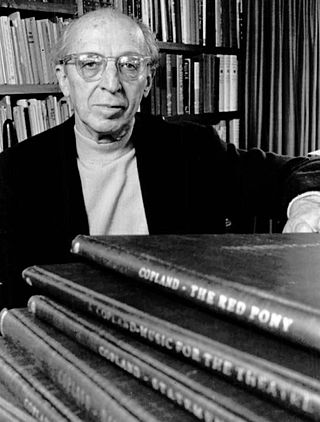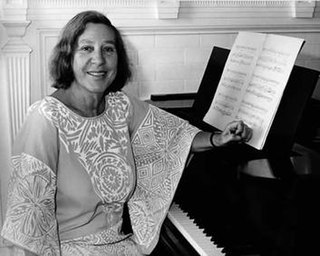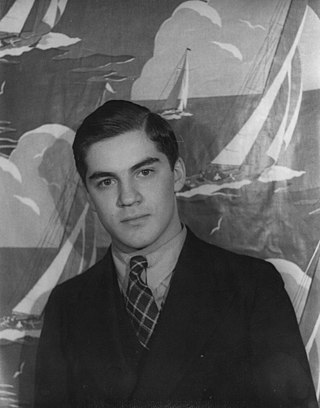Related Research Articles

Aaron Copland was an American composer, composition teacher, writer, and later a conductor of his own and other American music. Copland was referred to by his peers and critics as "the Dean of American Composers". The open, slowly changing harmonies in much of his music are typical of what many people consider to be the sound of American music, evoking the vast American landscape and pioneer spirit. He is best known for the works he wrote in the 1930s and 1940s in a deliberately accessible style often referred to as "populist" and which the composer labeled his "vernacular" style. Works in this vein include the ballets Appalachian Spring, Billy the Kid and Rodeo, his Fanfare for the Common Man and Third Symphony. In addition to his ballets and orchestral works, he produced music in many other genres, including chamber music, vocal works, opera and film scores.

Paul Frederic Bowles was an American expatriate composer, author, and translator. He became associated with the Moroccan city of Tangier, where he settled in 1947 and lived for 52 years to the end of his life.

Serge Koussevitzky, born Sergey Aleksandrovich Kusevitsky was a Russian-born conductor, composer and double-bassist, known for his long tenure as music director of the Boston Symphony Orchestra from 1924 to 1949.

Juliette Nadia Boulanger was a French music teacher and conductor. She taught many of the leading composers and musicians of the 20th century, and also performed occasionally as a pianist and organist.

The Aspen Music Festival and School (AMFS) is a classical music festival held annually in Aspen, Colorado.

Fanfare for the Common Man is a musical work by the American composer Aaron Copland. It was written in 1942 for the Cincinnati Symphony Orchestra under conductor Eugene Goossens and was inspired in part by a speech made earlier that year by then American Vice President Henry A. Wallace, in which Wallace proclaimed the dawning of the "Century of the Common Man".
Appalachian Spring is a musical composition by Aaron Copland that was premiered in 1944 and has achieved widespread and enduring popularity as an orchestral suite. The music, scored for a thirteen-member chamber orchestra, was created upon commission of the choreographer and dancer Martha Graham with funds from the Coolidge Foundation. It was premiered on Monday, October 30, 1944, at the Library of Congress in Washington D.C., with Martha Graham dancing the lead role. The set was designed by the American sculptor Isamu Noguchi. Copland was awarded the 1945 Pulitzer Prize for Music for his achievement.

Aberdeen International Youth Festival was a festival of performing arts and one of Scotland's major international cultural events, which ran from 1981 to 2017.
Howard Pollack is a prominent American pianist and musicologist, known for his biographies of American composers.
Lincoln Portrait is a classical orchestral work written by the American composer Aaron Copland. The work involves a full orchestra, with particular emphasis on the brass section at climactic moments. The work is narrated with the reading of excerpts of Abraham Lincoln's great documents, including the Gettysburg Address. An orchestra usually invites a prominent person to be the narrator.
The Tender Land is an opera with music by Aaron Copland and libretto by Horace Everett, a pseudonym for Erik Johns.

Vivian Fine was an American composer.
Sir Eugene Aynsley Goossens was an English conductor and composer.
Aaron Copland's Clarinet Concerto was written between 1947 and 1949, although a first version was available in 1948. The concerto was later choreographed by Jerome Robbins for the ballet Pied Piper (1951).
The Piano Variations of American composer Aaron Copland were written for piano solo from January to October 1930. They were dedicated to American writer and literary critic Gerald Sykes, and were originally published in 1932 by Cos Cob Press, which merged with Arrow Music Press in 1938 and was taken over by Boosey & Hawkes in 1956. The approximate performance time is 11 minutes.
The Second Hurricane is an opera in two acts by Aaron Copland to a libretto by Edwin Denby. Specifically written for school performances, it lasts just under an hour and premiered on April 21, 1937, at the Henry Street Settlement playhouse in New York City. Set in the United States in the 1930s, the opera tells the story of a group of high school students who become trapped on an island while working to rescue the victims of a hurricane.

John Kirkpatrick was an American classical pianist and music scholar, best known for championing the works of Charles Ives, Aaron Copland, Carl Ruggles, and Roy Harris. He gave the first complete public performance of Ives's Concord Sonata in 1939, which became a turning point in the composer's public recognition. Kirkpatrick played an important role in Ives scholarship, and he was leader in the Charles Ives Society. One important example is his role in the editing of Memos, which is a collection of Ives's autobiographical writings. At the time of his death Kirkpatrick was a professor emeritus at Yale University, where he had also been the curator of the Charles Ives archives.
Dance Panels is a ballet composed by Aaron Copland in 1959 for a planned collaboration with choreographer Jerome Robbins. After Copland had written the score, Robbins reneged on his commitment and the performance did not take place. Three years later, Copland revised the score for a ballet by the Bavarian State Opera in Munich, Germany, where it premiered on 3 December 1963. The ballet was performed by the New York City Ballet in 1965 and the concert version received its first performance at the Ojai Music Festival the following year. According to Copland biographer Howard Pollack, Dance Panels has proven from a musical standpoint one of the composer's more accessible late scores. While some of its more dissonant moments sound similar to Copland's twelve-tone compositions, other parts recall his earlier stage and screen music. It is also the only one of Copland's six ballets not written to a specific program.

Victor Hugo Etler Kraftsov, known as Victor Kraft, was a professional photographer and life-long friend of Aaron Copland.
The Short Symphony, or Symphony No. 2, is a symphony written by the American composer Aaron Copland from 1931 to 1933. The name derives from the symphony's short length of only 15 minutes. The work is dedicated to Copland's friend, the Mexican composer and conductor Carlos Chávez. The symphony's first movement is in sonata-allegro form, and its slow second movement follows an adapted ternary form. The third movement resembles the sonata-allegro but has indications of cyclic form. The composition contains complex rhythms and polyharmonies, and it incorporates the composer's emerging interest in serialism as well as influences from Mexican music and German cinema. The symphony includes scoring for a heckelphone and a piano while omitting trombones and a percussion section. Copland later arranged the symphony as a sextet.